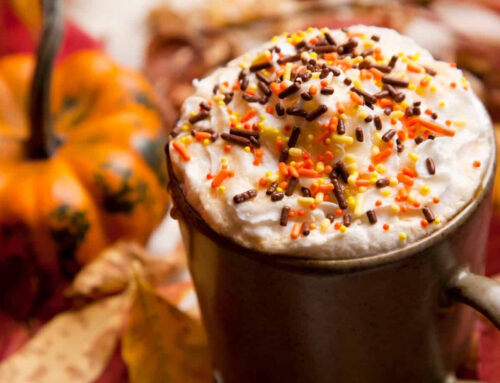The cold coffee craze is no longer just reserved for warm weather. Traditionally, the marketing push for iced coffee menu items reaches its height in the spring and summer seasons. However, consumers are increasingly gravitating towards iced coffee beverages, even in the winter months, for a variety of reasons.
As the coffee demographic widens and iced coffee largely becomes a drink of choice, foodservice operators have a great opportunity ahead of them to increase their year-round sales. We’ve put together this guide to answer your questions about the rising popularity of iced coffee year-round so you and your team can best serve your customers in every season.
When & Why Did This Shift Happen?
Iced coffee has existed as a coffee concept for decades but its real estate on menus has been building up significantly in recent years. Demographically, the rise in iced coffee is strongly tied to Millenials and Gen Z and their daily habits. One theory introduced by drink analysts attributes this preference to the fact that these generations grew up regularly consuming a wide variety of cold sodas and energy drinks. As they have become young adults and coffee becomes a part of their daily lifestyle, they are now seeking that experience through innovative iced coffee beverages. Additionally, iced coffee appeals to this health-conscious generation as an alternative to highly sugared beverages that offer a similar boost from caffeine.
Another key factor that has also drastically impacted the most recent increase in iced coffee consumption is lifestyle changes as a result of the pandemic. In particular, many Americans adapted to a more secluded lifestyle indoors, making coffee temperature preferences less relevant to the temperature outdoors. This ultimately has developed into a year-round craving that makes it necessary for restaurants, coffee shops, and cafes to serve iced coffee options during the winter months.
Why Customers Prefer Iced Coffee, Even in the Winter
Its Temperature Does Not Affect Flavor Strength & Consistency
A major perk of iced coffee is that the strength of its flavor does not solely depend on its temperature to be enjoyed. Often, hotter beverages rely on the aromatics that are released through heat and are best enjoyed as soon as poured. On the other hand, iced coffee concentrate stays relatively the same temperature from start to finish and can hold its flavor for longer. Many flavor profiles are even more pronounced at colder temperatures, such as popular winter seasonal offerings like pumpkin spice, peppermint, and cinnamon.
It’s a Thirst-Quencher Throughout the Day
Thirst is not always a result of hot weather and can happen at any point during the day. Though coffee has traditionally been associated with mornings, habits are changing and over 24% of consumers are adding an afternoon coffee to their routine. Iced coffee is a refreshing way to both satisfy the need for a midday pick-me-up and quench one’s thirst. Regardless of the season or the climate, an iced beverage is going to be more appealing after a workout or hours of errands than a hot beverage.
It Promotes Healthy Living
Coffee products, in general, are revered as a great source of antioxidants, but iced coffee goes a step further with health benefits in several ways. Iced coffee recipes tend to be less acidic and are considerably lower in carbs, calories, and sugar compared to competing cold drinks like milkshakes and smoothies. They also hold alternative dairy and sweeteners with more ease than their hotter counterparts.
Creative baristas have a lot more to work within the realm of health when it comes to iced coffee beverages. Try blending in supplements and vitamins with flavors like lavender, turmeric, and other trending flavors to bring more value to your offerings.
It’s Geo-Climate Friendly in the Southern U.S. & California
Though winter is undeniably present across the U.S., the annual climate change does not affect every state the same way. This is especially true to our partners here in Southern California, as well as in southwest and southeast states. Locations with milder, consistent temperatures year-round won’t need to be as concerned with the impact that winter weather has on their iced beverages. But even on the East Coast and in larger Northern cities (like New York and Chicago), cold coffee remains a necessity through the winter. People are spending more time indoors than ever, so colder temperatures outside the home and office do not extinguish their cravings for an iced beverage.
It’s Craveable & Trendy
It’s no secret on social media that there’s been an inherent shift in interest towards creatively crafted iced drinks among younger generations. With so many opportunities for businesses to share their innovative concoctions via social platforms like Instagram, Twitter, and Tik Tok, a pretty iced coffee swirling with almond milk and topped with a spring of lavender has a marketing pull that hot beverages can’t always compete with visually. Additionally, aesthetically-pleasing images of popular delicious iced beverages invoke a need and a craving to seek out new coffee experiences throughout the year. Diversifying your selection of iced coffee items is necessary to attract young customers. Furthermore, the demand for iced coffee and the resources required for it usually justify higher prices, meaning there is ample opportunity to increase revenue directly from it.
Key Takeaways
Hot coffee beverages will always be a classic staple that you need to have on your menu but iced coffee options are becoming just as necessary. Whether a customer needs a sweet thirst quencher, saw your barista artfully preparing a Coconut Almond Milk Iced Latte on their Tik Tok feed, or just prefer their coffee cold, foodservice businesses need to recognize this new trend as an important opportunity to reach a new audience and increase sales during every season.
The year-round iced coffee craze won’t be going anywhere anytime soon. If this change in approach is a new concept for your business, you are not alone. Gaviña Coffee specializes in educating foodservice partners and their teams on the latest industry trends and through training programs. Get in touch with us today to discover how an iced coffee menu can benefit your business.







